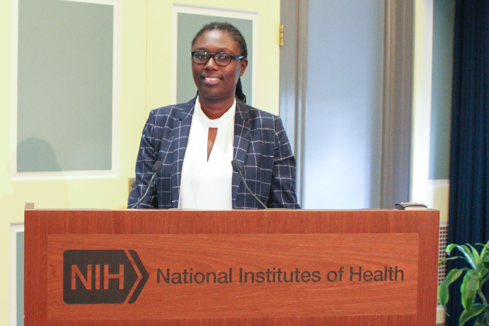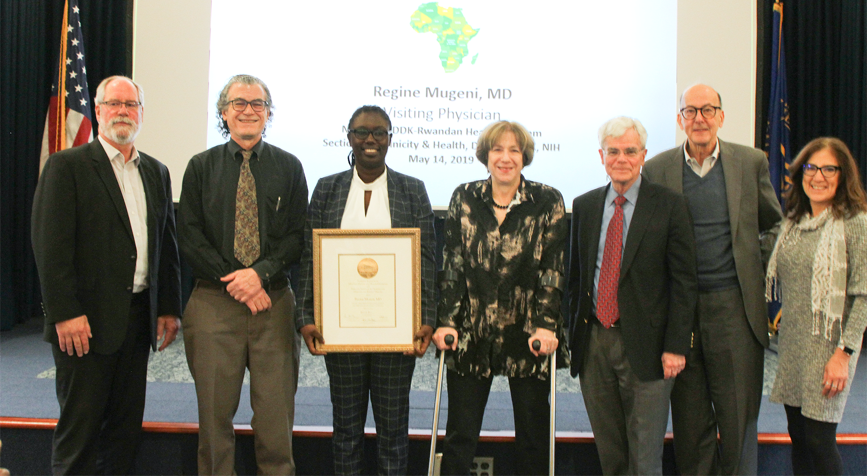Each year, the NIH-Rwandan Health Program welcomes a physician from Rwanda who is committed to becoming a clinician scientist. Regine Mugeni, M.D., a physician from Rwamagana Provincial Hospital, came to NIH in July 2018 and is the third fellow to complete the yearlong fellowship program. She has been working on finding an affordable and reliable way to predict diabetes in Africans.

Africa is expected to see the largest increase in diabetes in the world over the next few decades. The number of diabetes cases is predicted to rise by 156% from 2010 to 2045, with 25 million more Africans expected to develop the disease. An estimated 70% of Africans with diabetes have never been diagnosed and do not know that they have the illness.1
Even before diagnosis, it is useful to be able to predict whether a particular person is likely to get diabetes, because that individual can make diet and lifestyle changes to reduce his or her disease risk. Doctors can use blood tests and physical exams—in addition to considering risk factors, such as a patient’s family history of the disease—to predict diabetes. However, while this approach works well in U.S.-born and other global populations, it is less accurate for predicting diabetes in Africa, where clinical data on the risk factors is limited.2
Dr. Mugeni responded to this lack and the growing epidemic by working to develop a way to more accurately predict diabetes in Africans. “When the Rwandan Ministry of Health launched the opportunity for a physician to participate in the NIH-Rwandan Health Program, I applied right away,” said Dr. Mugeni. Under the mentorship of Anne E. Sumner, M.D., a senior investigator at the National Institute of Diabetes and Digestive and Kidney Diseases (NIDDK), Dr. Mugeni conducted a literature review of current diabetes prediction models in African-descent populations and tested a model that factors in the cost of measuring the health variables. The clinical study included about 450 Africans living in the United States. “We wanted this to be a cost-effective tool for populations at risk,” said Dr. Mugeni.
Prediction models, or prediction equations, project an individual’s likelihood of having or developing a disease, based on patterns seen in a comparable population. Working with NIH librarians, Dr. Mugeni identified 585 articles that described diabetes prediction equations. Only eight articles focused on people of African descent; these eight papers included 15 equations. One of the equations was found to perform well in African Americans. It considers nine factors, such as average blood sugar (A1C) and cholesterol.3 Dr. Mugeni evaluated the equation’s ability to identify undiagnosed diabetes in the study sample of Africans living in the United States, comparing diabetes predictions based on the equation with diagnostic exam results. She found that one measurement—a person’s blood sugar level after fasting—was as effective at spotting people with diabetes as the nine-variable equation. Having made this discovery in African Americans, Dr. Mugeni plans to test the equation in Rwanda. Her work has the potential to predict diabetes in Africa and determine who should receive further testing.
The first three Rwandan fellows have all been studying ways to better predict diabetes in Africans. “We are planning to take the studies back home to see if we can validate the studies at the population level,” said Dr. Mugeni. She and the two prior fellows plan to design and conduct a large project in Rwanda. The study may then expand to other countries in Africa. As an active member of the Rwandan community, Dr. Mugeni also expects “to stimulate public health discussion on cultural and cost issues.”
The experience at NIH was valuable, Dr. Mugeni said: “I learned about clinical research and gained another perspective on how to conduct research from my mentor, Dr. Sumner. I feel confident that when I go back home, I can conduct the study.” She said it will be helpful to continue to have Dr. Sumner as a guide to help her and the other Rwandan fellows continue as independent researchers while also advising other investigators-in-training. “Dr. Sumner bridged my career,” said Dr. Mugeni. “I am glad that she will continue to be my collaborator and mentor.”

In 2019, the NIH-Rwandan Health Program began a new collaboration with Rwanda’s University of Global Health Equity. The fourth fellow, who started in July 2019, will also focus on diabetes prevention and early detection among Africans.
Posted November 14, 2019
More Information
Learn more about the NIH-Rwandan Health Program

